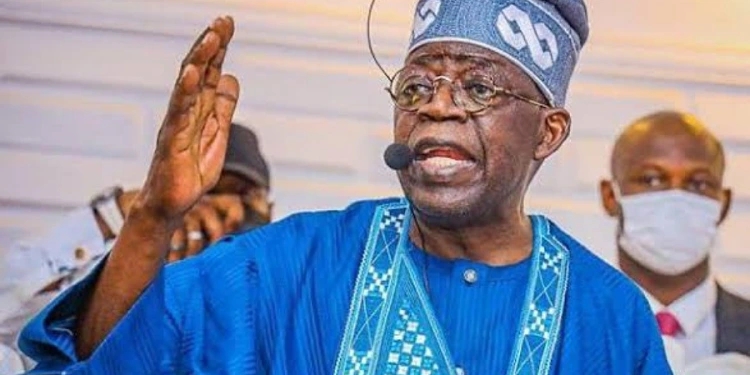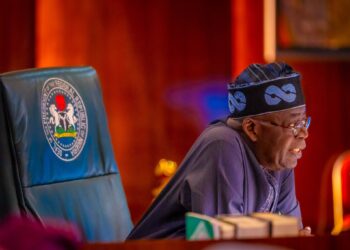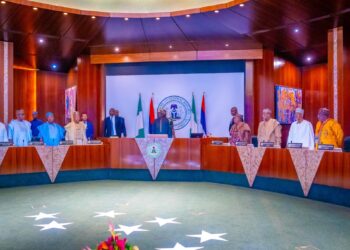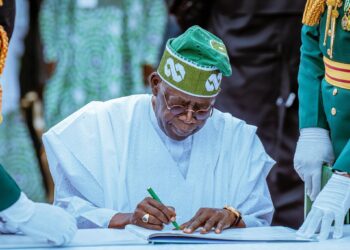Key highlights
- Based on his manifesto, Nigeria’s president-elect, Bola Tinubu, has good plans for the country’s natural gas sector.
- However, these plans can only be achieved if certain factors are put in place.
- Tinubu’s government could influence the completion of several key natural gas projects across the country that have the potential to contribute to economic growth.
If sworn into power this coming May, Nigeria’s president-elect, Bola Tinubu will need to reduce systemic corruption across the board, if his plans for Nigeria’s natural gas sector will work out. This is according to natural gas expert, Etulan Adu, who spoke to Nairametrics.
According to him, Tinubu will need to work hard to ensure that his administration can achieve its objectives for the natural gas sector. And this can only be achieved when systemic corruption is abolished. However, doing this might pose a challenge. He said:
- “A key challenge and expectation for the Tinubu administration are to ensure security, reduce oil theft, pipeline vandalism, attract investments, policy development and implementation, integrity and abolish systemic corruption for these plans to be actualized.”
Reviewing Tinubu’s gas plans: In his manifesto, Tinubu pledges to ramp up domestic supply by completing critical gas infrastructure projects, including pipeline infrastructure like the Ajaokuta-Kaduna-Kano gas pipeline. The administration will also enforce gas flaring penalties as well as setting up a unit to monitor gas flaring activities and instituting financial penalties for non-compliance.
His plans to tackle gas flaring: According to Adu, the experience in taxation with the Tinubu cartel would add value in terms of monitoring and collection of fines from gas flaring activities, which would generate funds for the government. Also, credits to companies with demonstrations of reduced flaring in operations would encourage both indigenous and international companies to invest more in the industry.
LNG sub-sector: Adu believes that Tinubu would tend to make a better push of things than the present administration. He said a Tinubu administration would push for the completion of the Nigerian Liquefied Natural Gas (NLNG) LimitedTrain-7 project, which could also increase expansion and possibly build new Liquefied Natural Gas facilities.
As a result of this, gas supplies to power generation facilities that have been epileptic over the years would possibly receive a boost and change the narrative of a failed power sector.
LPG sub-sector: Adu says he is not sure if the Tinubu administration would fix the importation of Liquefied Petroleum Gas (LPG) also known as cooking gas. According to him, more domestic gas facilities will need to be built and this would take some time.
The exploration and production sub-sector: Adu projects that the Tinubu administration would be very supportive of the Dangote Refinery, which is expected to be at full capacity by 2024. Also, the exploration and development of offshore natural gas fields would be supported by Tinubu. Adu further projects that new policy and licensing of offshore blocks could be carried out within two years of Tinubu’s administration.
Attracting natural gas investments: Adu identifies natural gas investments as a major challenge in the country’s future. He expresses concern over the ability of the Tinubu administration to adequately attract investors as Europe seeks more gas to survive. Countries like Algeria, Egypt and Morocco are ahead in this regard and there needs to be a significant shift in capacity and clear policies for Nigeria to be a part of that circle. Adu said:
- “Nigeria’s gas resources remain under-utilised with a lot of challenges. We need investments in Floating Liquefied Natural Gas (FLNG) to export natural gas. For the Trans African Gas Pipeline to Europe? Tinubu would love to look at it or maybe try a different approach.
- “Tinubu has great plans for natural gas. However, infrastructure is key, and the implementation of the Nigerian Gas Master Plan will be a challenge in terms of financing. But a strategic push and ability to attract investors to push cash for these projects will be an enormous task that the Tinubu administration could face. There will need to be a lot of effort in terms of community engagement and alignment with the new Petroleum Industry Act (PIA) to bring these projects to fruition.”
What you should know: Tinubu revealed his plans to support gas-to-power initiatives, to improve the power supply in the country. He is interested in supporting projects that will optimize power grid reliability, grid interconnectedness and grid wheeling. He is committed to completing the Siemens power deal under the presidential power initiative (PPI) by the Buhari administration.
The President-elect also said his administration is committed to removing fuel subsidies as proposed by the Buhari administration as it is no longer sustainable. This will increase transportation costs. However, Tinubu plans to establish transport subsidies to ease the burden on Nigerians.
























Tinubu to now tackle corruption? Wonderful. Smh.
Tinubu could consider beginning with the P&ID arbitration case in London. This lengthy 13-year dispute has effectively obliterated the Nigerian gas sector’s reputation and dependability by exposing the widespread corruption and systemic decay within the industry. Furthermore, it has raised serious doubts about the rule of law and the ability to enforce contracts with the Federal Government in Nigeria. If Tinubu aims to draw foreign investment and attract potential purchasers of Nigerian gas, resolving the P&ID case should be his utmost priority.
The major thing Tinubu needs to do is to sanitize the industry to attract the much needed investment. Gas monetization is expensive and no investor will put their money where there is no clear policy direction and fiscal transparency and accountability.